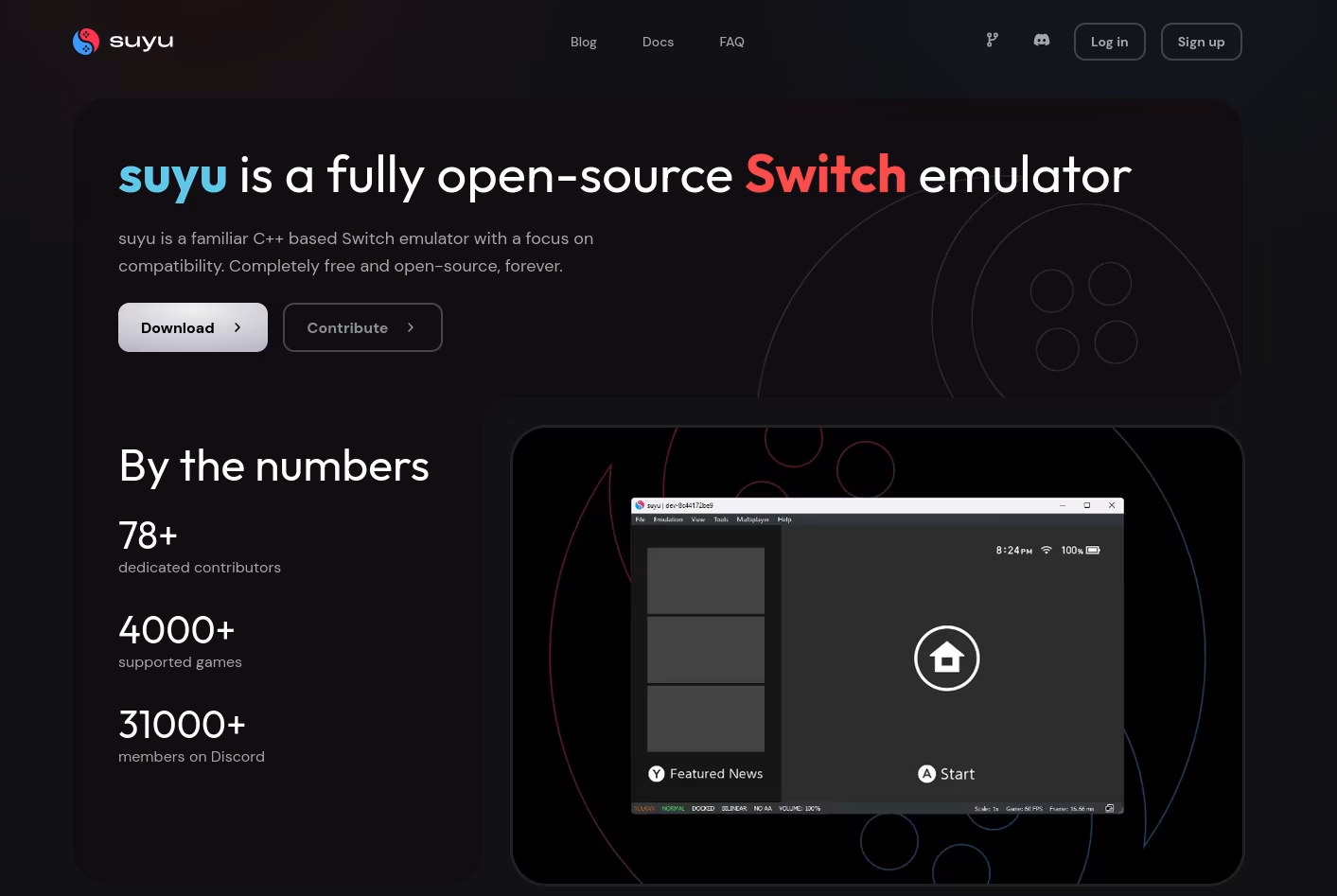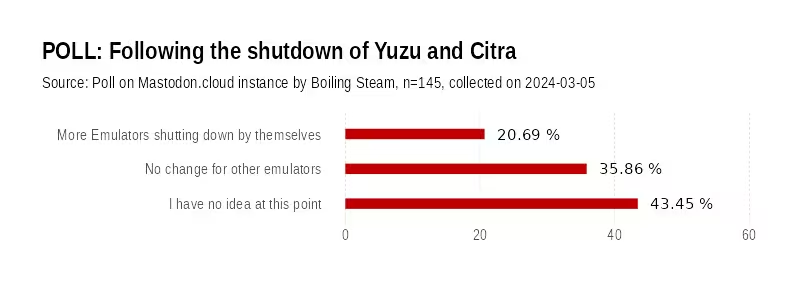Yuzu Shuts Down Following Nintendo's Threat. What's Next?
I meant to cover this a little earlier, but better late than never. Following the recent federal lawsuit filed by Nintendo America against Yuzu, the popular Nintendo Switch emulator developed by Tropic Haze, the company has decided to shut down, settle with Nintendo, and take down all of its emulators from its site and related GitHub accounts.

Despite the claims that Tropic Haze is going to pay 2.4 Million dollars to Nintendo in damages, the actual settlement out of court is usually confidential and nobody really knows what the conditions really are (and how much money is actually involved). In other words, don’t believe the press releases litterally. Press releases are for narrative control - the truth is often something else.
This is the official statement by Tropic Haze:
We write today to inform you that yuzu and yuzu’s support of Citra are being discontinued, effective immediately. Yuzu and its team have always been against piracy. We started the projects in good faith, out of passion for Nintendo and its consoles and games, and were not intending to cause harm. But we see now that because our projects can circumvent Nintendo’s technological protection measures and allow users to play games outside of authorized hardware, they have led to extensive piracy. In particular, we have been deeply disappointed when users have used our software to leak game content prior to its release and ruin the experience for legitimate purchasers and fans. We have come to the decision that we cannot continue to allow this to occur. Piracy was never our intention, and we believe that piracy of video games and on video game consoles should end. Effective today, we will be pulling our code repositories offline, discontinuing our Patreon accounts and Discord servers, and, soon, shutting down our websites. We hope our actions will be a small step toward ending piracy of all creators’ works.
But what was the case against Yuzu, exactly?
The case against Yuzu
Nintendo argued that Yuzu infringes on their intellectual property rights by allowing users to decrypt Switch software through the use of obtained keys. This alleged violation falls under the Digital Millennium Copyright Act (DMCA), which prohibits circumvention of software protections. This all-encompassing bill has been used against numerous projets in the past (for things like reverse engineering as well), and its weaponization continues to this day.
The lawsuit from Nintendo reads:
A video game emulator is a piece of software that allows users to unlawfully play pirated video games that were published only for a specific console on a general-purpose computing device
The suit goes on to describe the fact that Nintendo has put in place cryptographic keys in each console to prevent the execution of unlicensed content at runtime:
Specifically, every Nintendo Switch video game stored on a Nintendo physical cartridge or on a Nintendo Switch console as a digital download is secured with multiple technological measures, including encryption that scrambles the audiovisual content in the game file to make it unreadable without the use of proprietary cryptographic keys. In the ordinary course of operation, an authentic Nintendo Switch console will use certain cryptographic keys available to the console, commonly referred to as the “prod.keys,” to decrypt other cryptographic keys associated with games, and then use those keys to decrypt lawfully-purchased games during runtime. Only if the games are dynamically decrypted during operation of the console may the user play those games.
Yuzu does this by executing code necessary to defeat Nintendo’s many technological measures associated with its games, including code that decrypts the Nintendo Switch video game files immediately before and during runtime using an illegally-obtained copy of prod.keys (that ordinarily are secured on the Nintendo Switch). Users obtain the prod.keys either through unlawful websites or by unlawfully hacking a Nintendo Switch console. The lead developer of Yuzu—known online under the alias “Bunnei” has publicly acknowledged most users pirate prod.keys and games online, and Yuzu’s website provides instructions for its users telling them how to unlawfully hack their own Nintendo Switch and how to make unauthorized copies of Nintendo games and unlawfully obtain prod.keys.
Despite Nintendo’s claim that Yuzu contains these keys itself, the open-source emulator does not. Users are required to obtain them separately. Nintendo’s legal argument heavily relies on Yuzu’s Quickstart Guide, which provides instructions on how to hack older Switches to dump decryption keys or game files. This guide also links to external tools that break console and game encryption techniques. By acknowledging that using Yuzu necessitates hacking into a Nintendo Switch, Nintendo argues that there is no lawful way to use the emulator to play Nintendo Switch games.
However, some experts believe that Nintendo’s arguments may not be entirely valid. According to lawyer and emulation expert Richard Loiterman, Nintendo’s statement that users are restricted from using games on any device other than the Switch goes against the US Copyright Office’s exceptions and limitations on licensing terms. This could potentially serve as a possible defense for the emulator makers.
Despite these potential loopholes, the threat from Nintendo’s lawsuit is significant in practical terms. Nintendo’s primary goal seems to be targeting the tools and techniques necessary for emulation to function rather than challenging emulation’s legality as a whole. Yuzu’s shutdown serves as a reminder of the ongoing tension between video game companies’ efforts to protect their intellectual property rights and emulator developers’ attempts to preserve and expand access to games.

My take
First, I would say that the case from Nintendo has some amount of merit. When you are emulating an older system, that is not actively sold anymore, you can make the case that the emulator has very little impact on the company’s actual bottomline. With emulators for systems like the Switch, still very much alive and commercially successful right now, you enter a dangerous grey zone where the manufacturer can make a reasonable claim related to market losses. Proving the actual losses is going to be a very difficult thing to do, but one can always create bullshit data and go wild with it.
In the end, if your objective is to bankrupt the entity developing the emulator, a significant threat is enough in places like the US since the lawyer fees are sufficient to bankrupt anyone wanted to defend itself over a long period of time. On top of that, the developers were actively collecting money from end users to develop Yuzu, and they were well aware that indeed, most users of Yuzu were probably NOT the people who were dumping the keys from their own Switch hardware.
This being said, this is a clear overreach by lawsuit-happy Nintendo who loves to play rough on smaller entities or individuals when it comes to defending their turf. Nintendo makes billions of profit every year, and does not need to go to such lengths. The legitimate sales of the Switch are not threatened in any meaningful way by Yuzu or Ryujinx, no matter how widespread their use might be on PC. And if they really cared about fighting emulation, the best way would be to release a new, more powerful device, which would delay for a few years any kind of meaningful effort. But working on innovation is hard when you are an Nintendo exec sitting on a cash cow.
The impact on Yuzu, and other emulators
So Yuzu has shut down, but it being an open-source solution means that the sources are still out there. A few hours after the official discontinuation of the official repo, a few forks popped up (one by a 15 years old who quickly realized it was probably not a good idea to keep a new repo live on GitHub) and a more serious one seems to be Suyu (pronounced Sue-you). This new fork takes some distance from Yuzu, by:
- not asking for money for the development
- making it very clear everywhere that piracy related discussions are not OK
- removing any reference related to Tropic Haze inside the source code
- Removing the generation of title.keys from Yuzu’s code (game specific encryption keys). Suyu will require end users to provide their own title.keys, prod.keys, and firmware from their Switch console.

They started by having a Gitlab repository up. Bad idea. Gitlab can be easilied DMCA’ed, just like GitHub, and this is exactly what happened in a matter of hours. At the time of writing they have moved to a self-hosted gitea instance (hopefully learning by now that it’s better to stay outside of the USA jurisdiction). How far the game of whack-a-mole will go is still a question. The advantage of FOSS in this area is that the source code is widely available, and as long as there are people willing to work on it, it will never disappear. You could even do git version control by email, completely decentralized, and go completely off the radar. Nintendo’s lawfare only has a limited reach in the end. So, Suyu and other forks will probably continue, while you should expect them to be less visible and induce more friction to get things to work.
The elephant in the room is Ryujinx.
First, Ryujinx has so far been unaffected by this suit. Their patreon page is still online, and there is no sign that they have been approached by Nintendo at this stage. Ryujinx has never been as remotely popular as Yuzu, so its threat level is probably somewhat lower, but if Yuzu can be attacked, the same arguments can likely still apply to Ryujinx if Nintendo really cares. It could be that it’s still a matter of time.
And then there’s the collateral damage on Citra, the Nintendo 3DS emulator. It was mostly considered a finished emulator as most of the key games people wanted to play ran on it already, but it was wiped out at the same time as Yuzu since it was also developed by Tropic Haze. I would not worry too much about its future (archives and source code will continue to circulate) but distribution through major channels may become challenging in the future.
Now that’s for current, existing emulators. How will this impact future emulators is THE billion dollar question. Asking you guys on our Mastodon account, most of you don’t think that there will be a major impact on other emulators for now, while there is a large percentage of us who seem to be uncertain of what to make of this.

When the Switch 2, or whatever it’s called, is released, will Nintendo attack anyone trying to build even any remotely experimental emulator from the get go? It looks like Nintendo is becoming more and more trigger happy with the times, and this may have a chilling effect to dissuade whoever wants to try next. Suyu may end up becoming a good case study. If it keeps surviving in the end, and being actively developed, it may show a path on how emulators can still exist - following a set of rules that can be re-applied from there on.
We will keep covering this topic as new developments occur.
